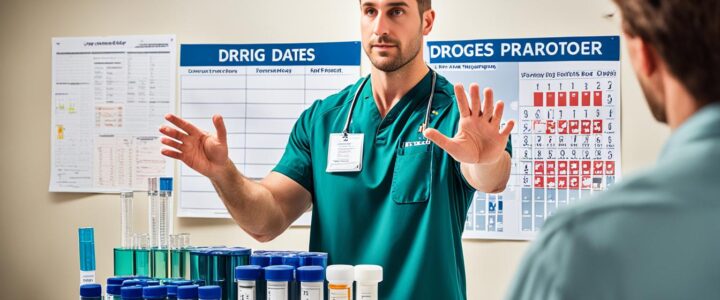Did you know that in 2021, there were 2,266 people killed in alcohol-related crashes where the driver had a Blood Alcohol Concentration (BAC) of .01 to .07 g/dL? That’s a staggering number of lives lost due to impaired driving.
Drunk driving accidents are a significant issue on the roadways, with alcohol impairing a driver’s ability to think, reason, and coordinate their muscles. Even a small amount of alcohol can affect driving ability, leading to accidents.
In this article, we will explore the effects of alcohol on driving, factors affecting BAC, risks of driving with a high BAC, impacts of drunk driving on different groups, consequences of drunk driving, responsible driving practices, and the efforts made by the National Highway Traffic Safety Administration (NHTSA) to combat drunk driving. Understanding the scale of the problem and taking preventive measures can help us create safer roadways.
Let’s delve into the effects of alcohol on driving and how we can prevent drunk driving accidents.
Effects of Alcohol on Driving
Understanding the effects of alcohol on driving is crucial to comprehend the risks and dangers associated with driving under the influence. The impact of alcohol on driving ability is directly correlated to the Blood Alcohol Concentration (BAC) level. BAC is a measure of the amount of alcohol present in a person’s bloodstream.
At a BAC of .02, individuals may experience a slight loss of judgment and relaxation. Their ability to make rational decisions and respond quickly to changing road conditions may be compromised.
When the BAC reaches .05, the effects become more pronounced. Individuals may exhibit exaggerated behavior, impaired judgment, and reduced coordination. This can manifest as an increased risk-taking behavior, impaired visual functions, and difficulties controlling movements.
As the BAC rises to .08, the effects become more severe. Muscle coordination becomes poor, making it challenging to control movements effectively. Concentration and short-term memory can be significantly impacted, making it difficult to stay focused on the task of driving. Furthermore, impaired perception can result in diminished awareness of the surrounding environment.
A BAC of .10 further exacerbates the impairments. Reaction time and control deteriorate, and thinking becomes slow and less responsive. This delayed reaction time can significantly increase the risk of accidents as drivers may be unable to respond quickly to sudden changes or hazards on the road.
At the highest BAC level of .15, individuals experience a major loss of balance and have substantial impairment in vehicle control. These effects can make it extremely difficult to remain in the correct lane, properly steer the vehicle, and respond appropriately to traffic signals or other vehicles.
The consequences of alcohol impairment on driving cannot be underestimated. Reduced coordination, impaired judgment, and compromised reaction time significantly increase the risk of accidents. It’s imperative to recognize the effects of alcohol on driving ability and make responsible decisions to ensure road safety.
Factors Affecting BAC
When it comes to Blood Alcohol Concentration (BAC), several factors come into play. Understanding how these factors affect your BAC level is important in determining your level of impairment and making responsible decisions on the road.
Number of Drinks
The number of drinks you consume directly impacts your BAC. Each alcoholic beverage you consume adds to the alcohol content in your bloodstream. The more drinks you have, the higher your BAC will be. It’s essential to keep track of the number of drinks you consume to gauge your level of impairment.
Drinking Speed
The speed at which you consume your drinks also affects your BAC. Consuming multiple drinks quickly can lead to a rapid increase in your BAC. Your body needs time to process and metabolize the alcohol, so spacing out your drinks over a longer period can help mitigate the effects.
Gender
Gender plays a role in BAC levels due to differences in body composition. Women tend to have higher body fat and lower water content compared to men. As a result, alcohol is less diluted in the female body, leading to higher BAC levels for the same amount of alcohol consumed. It’s important for women to be cautious and mindful of their alcohol consumption.
Weight
Weight also influences BAC because alcohol disperses more readily in body water than body fat. The more water there is in your body, the more alcohol gets diluted, resulting in a lower BAC. Individuals with higher body weight and more water content tend to have a lower BAC compared to those with lower body weight.
Food in Stomach
Having food in your stomach can help slow down alcohol absorption into your bloodstream. When you consume alcohol on an empty stomach, it is quickly absorbed, leading to a higher BAC. Eating a meal before or while drinking can help mitigate the rapid increase in alcohol concentration, reducing the overall impact on your BAC level.
By considering these factors—number of drinks, drinking speed, gender, weight, and food in the stomach—you can better understand how they contribute to your BAC level. However, it’s important to note that BAC can vary widely depending on these factors, making it difficult to assess your own level of impairment accurately. Always err on the side of caution and prioritize your safety and the safety of others on the road.
Risks of Driving with a High BAC
Driving with a high Blood Alcohol Concentration (BAC) significantly increases the risk of accidents. At a BAC of .08, drivers are approximately 4 times more likely to crash than those with a BAC of zero. The risk increases even more at a BAC of .15, with drivers being at least 12 times more likely to crash.
Impaired driving due to alcohol affects various aspects of a driver’s performance, including visual tracking, divided attention, coordination, speed control, and lane position. These impairments contribute to the higher crash risk associated with driving with a high BAC. When under the influence, drivers may struggle to maintain their focus on the road, have difficulty coordinating their movements, and experience challenges in controlling their speed and staying within their designated lane.
It is important to note that young males are especially at risk when it comes to driving with a high BAC. This demographic has been shown to be more prone to engage in risky behaviors, including impaired driving, which further increases the likelihood of accidents.
By understanding the risks associated with driving with a high BAC and the negative impact it has on visual tracking, divided attention, coordination, speed control, and lane position, individuals can make informed decisions to prioritize responsible and safe driving practices.
Impacts of Drunk Driving on Different Groups
Drunk driving has far-reaching consequences, affecting various groups within society. From underage drinking drivers to motorcycle riders and repeat offenders, the dangers and impact of impaired driving are undeniable.
Underage Drinking Drivers
Approximately a quarter of fatal crashes involve an underage drinking driver. This statistic highlights the significant risk young drivers face when they choose to drive under the influence. To combat this issue, setting a minimum legal drinking age of 21 has been instrumental in saving thousands of lives.
Motorcycle Riders
Motorcycle riders are particularly vulnerable to the dangers of drunk driving. They have a high percentage of alcohol-impaired drivers involved in fatal crashes. The combination of impaired coordination and reduced reaction time significantly increases the risk of accidents.
Repeat Offenders
Repeat offenders with prior convictions for driving while impaired pose a significant risk to road safety. Despite facing legal consequences, these individuals continue to choose to drink and drive, putting themselves and others at risk.
Child Fatalities
Tragically, a quarter of child fatalities in motor vehicle crashes involve drunk driving. These innocent victims bear the consequences of the irresponsibility and poor judgment of impaired drivers. Protecting our children on the roadways should be a top priority.
Financial Impact
The financial impact of drunk driving is substantial, costing the United States billions of dollars annually. These costs stem from medical expenses, property damage, lost productivity, legal fees, and the burden on the healthcare system. Addressing the issue of drunk driving is not only crucial for public safety but also for the financial well-being of our society.
By recognizing the specific impact of drunk driving on different groups, we can work towards implementing effective prevention strategies and reducing the devastating consequences for individuals and communities.
For more information on the dangers of drunk driving and preventative measures, visit the National Highway Traffic Safety Administration (NHTSA) website.
Consequences of Drunk Driving
Drunk driving carries severe consequences, and the enforcement of drunk-driving laws is essential to reduce the occurrence of these incidents. Depending on the severity of the offense, charges for drunk driving can range from misdemeanors to felony offenses.
Penalties for drunk driving can include driver’s license revocation, hefty fines, and even jail time. A revoked driver’s license can significantly impact one’s mobility and ability to perform daily tasks. The financial burden resulting from fines and potential legal fees can also be substantial.
In addition to these penalties, offenders may be required to install ignition interlock devices in their vehicles. These devices prevent the vehicle from operating if the driver’s blood alcohol concentration (BAC) is above a pre-set limit, ensuring they do not drive under the influence again.
It’s crucial to understand that the consequences of drunk driving extend beyond legal penalties. Drunk driving poses a significant risk to both the driver and others on the road, including passengers, pedestrians, and other motorists. The potential for serious injuries or even fatalities is alarmingly high in drunk driving accidents.
The enforcement of drunk-driving laws aims to deter individuals from driving under the influence and protect the safety of everyone on the road. By raising awareness about the severe consequences of drunk driving, society can work towards preventing these tragic incidents.
Responsible Driving Practices
Being a responsible driver means making safe choices. By following these practices, you can help ensure your safety on the road and reduce the risk of accidents.
Plan for a Designated Driver or Non-Drinking Friend
Before heading out for a night of fun, arrange for a designated driver or choose a non-drinking friend who can ensure a sober ride home. This simple step can prevent you from getting behind the wheel when you’re impaired.
Utilize Taxis or Ride-Hailing Services
If you’ve been drinking and need a ride, avoid driving and instead call a taxi or use a ride-hailing service like Uber or Lyft. These convenient options provide a safe and reliable way to get home without putting yourself or others at risk.
Hosting Parties? Ensure Sober Drivers
When hosting parties where alcohol is served, it’s important to ensure that your guests have a sober driver to take them home. Encourage responsible drinking and provide alternative transportation options if needed.
Always Wear Your Seat Belt
Wearing your seat belt is a fundamental practice that can protect you from the actions of impaired drivers. Seat belts significantly reduce the risk of injury during accidents, so make it a habit to buckle up every time you get in a vehicle.
Report Impaired Drivers
If you witness someone driving while impaired, it is crucial to report them to local law enforcement immediately. Your action can help prevent potential accidents and save lives.
By integrating these responsible driving practices into your life, you can contribute to safer roadways and protect yourself and others from the dangers of impaired driving.
NHTSA’s Efforts to Combat Drunk Driving
The National Highway Traffic Safety Administration (NHTSA) is dedicated to eliminating drunk driving by implementing various strategies and initiatives.
Research
NHTSA conducts extensive research to understand the factors contributing to drunk driving accidents and identify effective prevention strategies. This research provides crucial insights into the behavior, attitudes, and risk factors associated with impaired driving.
Public Awareness Campaigns
NHTSA runs impactful public awareness campaigns to educate the public about the dangers of drunk driving and promote responsible behavior. Campaigns like Drive Sober or Get Pulled Over, Buzzed Driving Is Drunk Driving, and Ride Sober or Get Pulled Over raise awareness of the risks and consequences of driving under the influence.
State Safety Grant Programs
NHTSA supports state safety grant programs to enhance law enforcement efforts and promote safe driving practices. These programs provide funding to states for initiatives such as increased enforcement, public education campaigns, and the implementation of technology to combat drunk driving.
Through these efforts, NHTSA aims to reduce the prevalence of drunk driving and achieve zero drunk-driving crashes on the roadways. By conducting research, running public awareness campaigns, and supporting state safety grant programs, NHTSA strives to make the roads safer for everyone.
Drunk Driving and Accidents
Drunk driving is responsible for a significant number of preventable accidents on the roadways. The impairment caused by alcohol greatly affects a driver’s thinking, reasoning, and coordination, leading to costly mistakes while behind the wheel.
Drunk driving can contribute to various types of crashes, including rear-end accidents, T-bone accidents, head-on collisions, and vehicle rollovers. These accidents can result in severe injuries and even fatalities, making it crucial to address the issue and promote responsible driving habits.
Motorcycle riders are particularly overrepresented in fatal drunk driving accidents due to the inherent risks associated with impaired motorcycle operation. Additionally, alcohol impairment plays a significant role in pedestrian deaths, highlighting the need for increased awareness and prevention efforts.
Furthermore, drunk drivers face severe consequences for their actions. In addition to potential injury to themselves and others, they may face criminal charges, license suspension or revocation, hefty fines, mandatory alcohol education programs, and even jail time. Punitive damages may also be pursued in civil cases against drunk drivers.
Preventable Accidents
- Impairment caused by alcohol leads to preventable accidents on the roadways.
- Drunk driving can result in rear-end accidents, T-bone accidents, head-on collisions, and vehicle rollovers.
Motorcycle Accidents and Pedestrian Deaths
- Motorcycle riders are overrepresented in fatal drunk driving accidents.
- Alcohol impairment is a significant factor in pedestrian deaths caused by drunk drivers.
Consequences for Drunk Drivers
- Drunk drivers face potential injury to themselves and others.
- They may also face criminal charges, license suspension or revocation, fines, mandatory education programs, and jail time.
- Punitive damages can be pursued in civil cases against drunk drivers.
Prevalence of Impaired Driving
Impaired driving is a prevalent issue in the United States. Each year, around 1 million arrests are made for driving under the influence of alcohol and/or drugs. While these arrests indicate law enforcement efforts, they only capture a portion of the instances of impaired driving on the road.
Self-report surveys provide insight into the true scope of the problem. These surveys indicate that millions of people drive under the influence of alcohol, marijuana, and illicit drugs. The prevalence of alcohol-impaired driving is significant, with a considerable number of U.S. residents driving under the influence of alcohol in the past year. Additionally, the use of marijuana and illicit drugs other than marijuana while operating a vehicle is also a cause for concern.
Addressing impaired driving requires ongoing efforts to raise awareness, increase enforcement, and promote responsible behavior. By understanding the prevalence of impaired driving and its associated risks, we can work towards creating safer roadways for everyone.
Conclusion
Drunk driving accidents have serious consequences and can be prevented by understanding the risks and taking appropriate measures. By recognizing the effects of alcohol on driving and the dangers it poses, you can make informed decisions to stay safe on the roadways. Utilizing prevention strategies such as designated drivers, alternative transportation, and reporting impaired drivers can help reduce the prevalence of drunk driving accidents.
Responsible driving practices play a crucial role in preventing drunk driving accidents. Always remember to wear your seat belt, follow traffic laws, and remain focused while driving. By practicing defensive driving techniques and staying alert, you can decrease the likelihood of accidents caused by drunk drivers.
Additionally, public awareness campaigns play an essential role in educating the community about the dangers of drunk driving and promoting responsible behavior. Supporting these campaigns and spreading the message about the importance of staying sober behind the wheel can contribute to safer roadways and a decrease in drunk driving accidents.
Together, by staying informed, making safe choices, and advocating for prevention strategies, we can all work towards a future with fewer drunk driving accidents and safer roadways for everyone. If you have been involved in an auto accident with a drunk driver, call an auto accident lawyer right away.






